Biology topic 2: Organisation
1/35
Earn XP
Description and Tags
Manually made from pmt past paper answer and mark schemes
Name | Mastery | Learn | Test | Matching | Spaced |
|---|
No study sessions yet.
36 Terms
Carbohydrates are need as part of a balanced diet. What is the formula for glucose?(1)
C6H12O6
What type of enzyme breaks down starch?(1)
Carbohydrase
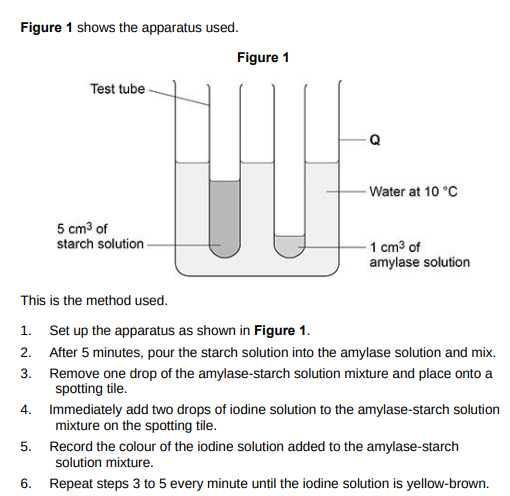
A student investigated the effect of temperature on the activity of the enzyme amylase.Name apparatus Q in Figure 1.(1)
Beaker
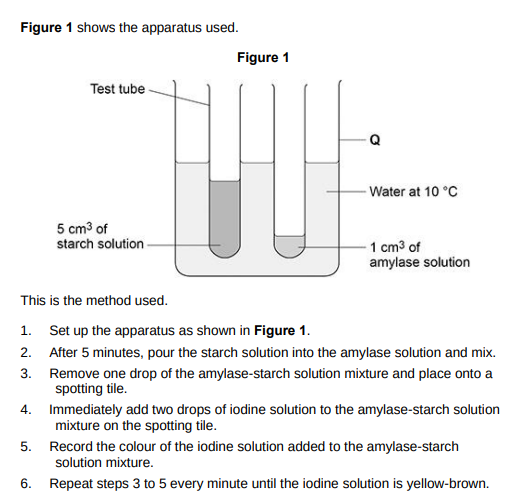
A student investigated the effect of temperature on the activity of the enzyme amylase. Why were the starch solution and the amylase solution left for five minutes before mixing them together?(1)
So that both solutions reach 10 degrees.
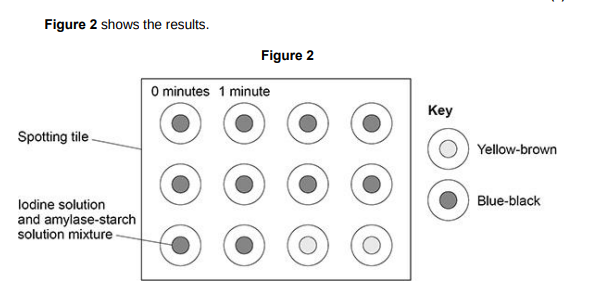
How many minutes did it take until the iodine solution and amylase-starch solution mixture was yellow-brown?(1)
10 minutes
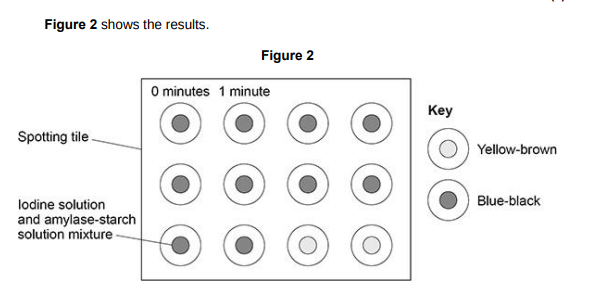
How could a more accurate time be obtained?(1)
Test the mixture with iodine solution every 30 seconds
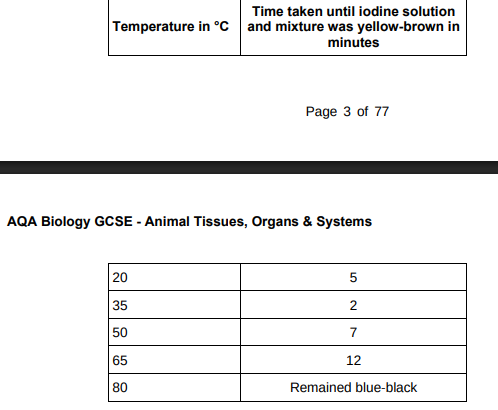
Which temperature did the enzyme work quickest at?(1)
35 degrees Celsius, as this is optimal for amylase activity.
Explain why the iodine solution remained blue-black in the investigation at 80 °C.(2)
Enzyme is denatured so starch is not broken down
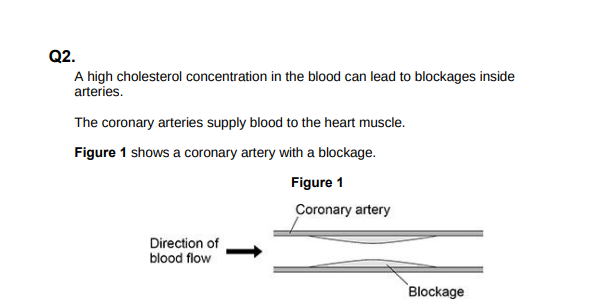
Why could the blockage in Figure 1 cause cells in the heart to die?(2)
Less blood flows through so less oxygen
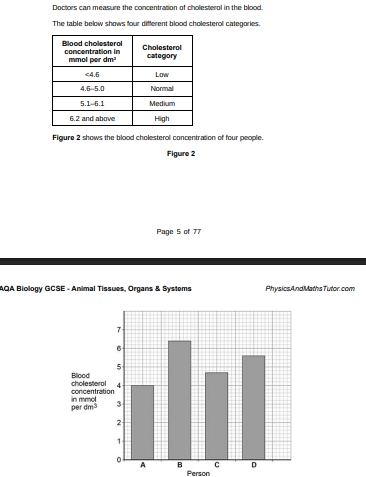
Which person is in the medium cholesterol category?(1)
D
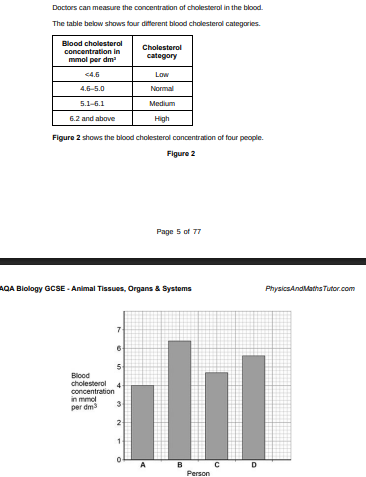
Which person is most at risk of having a heart attack? Give a reason for your answer to part (c).(1)
B because this person is more likely to get a blockage
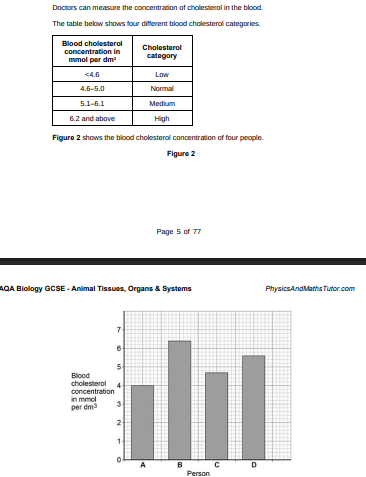
The blood cholesterol concentration of person D is greater than the blood cholesterol concentration of person A. Calculate how many times greater(2)
5.6/4 = 1.4
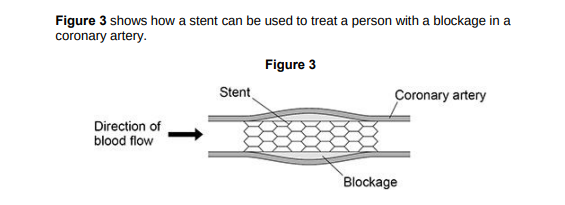
Explain how a stent works as a treatment for a person with a blockage in a coronary artery.(2)
Widens artery so more blood can flow through
Patients are given anti-clotting drugs after they have a stent fitted. The drugs help to prevent clots forming in the blood. Which part of the blood starts the blood clotting process?(1)
Platelets
When a stent is fitted the doctor gives the patient an injection of anti-clotting drugs. The patient then takes one anti-clotting tablet every day. Anti-clotting drugs:
• are very effective
• can take a week to begin working fully
• have been used for over 60 years
• cost very little to make
• do not work effectively if the patient eats certain types of food.
The patient must have their blood tested every few weeks to check that the anti-clotting drugs are working.
Evaluate the use of anti-clotting drugs in patients who have had a stent fitted.(4)
The drugs are cheap so people can afford them and they are effective so the patient is less likely to get a clot meaning the drugs have quality and value. On the other hand, the patient may forget to take the drug every day or eat the wrong foods causing the drugs to not work as effectively. Overall I conclude that anti clotting drugs are worth it as they are effective and cheap and only stop working when it is the patients fault depending on what they do.
Amylase is an enzyme that breaks down starch. Amylase is a polymer of smaller molecules. Name the type of smaller molecule.(1)
Amino acids
Name the three parts of the human digestive system that produce amylase.(2)
salivary gland, pancreas, small intestine
Explain how amylase breaks down starch. Answer in terms of the ‘lock and key theory’(3)
The substrate binds to the enzyme’s active site because the active site and the substrate are complementary. A chemical reaction then occurs to produce smaller molecules.
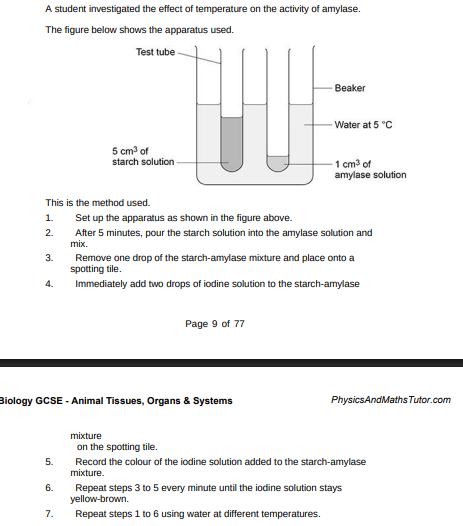
Name two control variables the student used in the investigation(2)
volume of starch, volume of amalayse
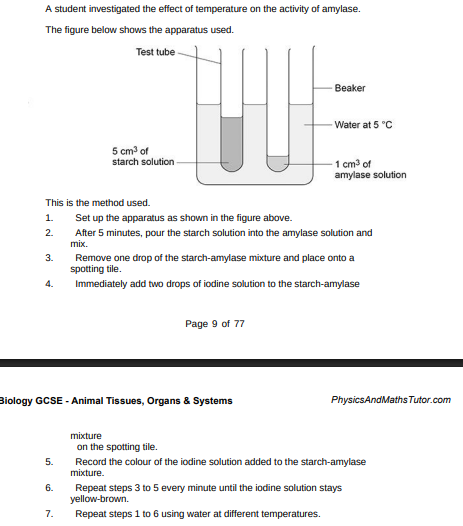
Why did the student leave the starch solution and amylase solution for 5 minutes before mixing them?(1)
to allow both solutions to reach 5 degrees
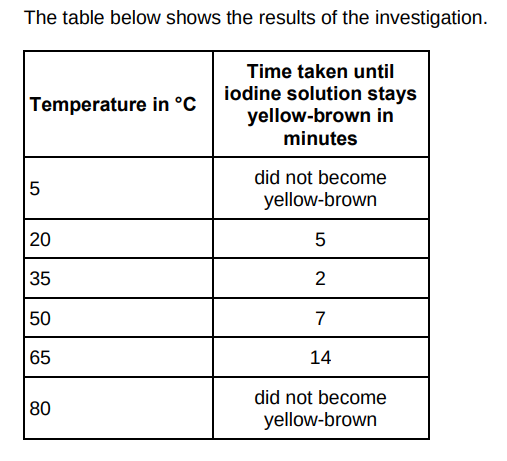
What conclusion can be made about the effect of temperature on amylase activity between 20 °C and 65 °C?(1)
as temperature increases, enzyme activity increases to 35 degrees after which activity decreases
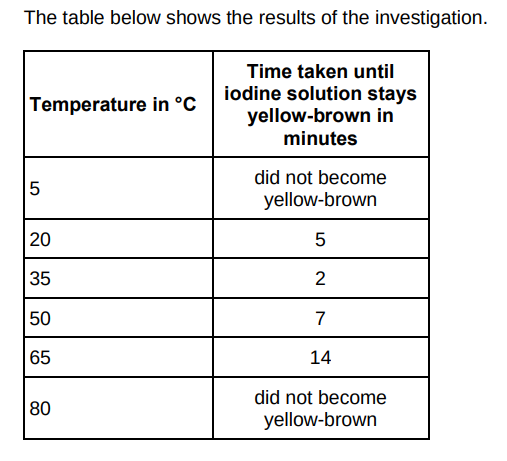
Explain the results at 5 °C and at 80 °C(5)
Iodine is not yellow-brown because starch has not been broken down. At 5 degrees amalayse has low kinetic energy so there are fewer enzyme substrate collisions. At 80 degrees the amalayse has been denatured so the starch can no longer fit.
The student investigated the effect of temperature on amylase activity. Describe how the student could extend the investigation to determine the effect of a different factor on amylase activity.(2)
Keep temperature constant but change named factor and test a range of values of named factor.
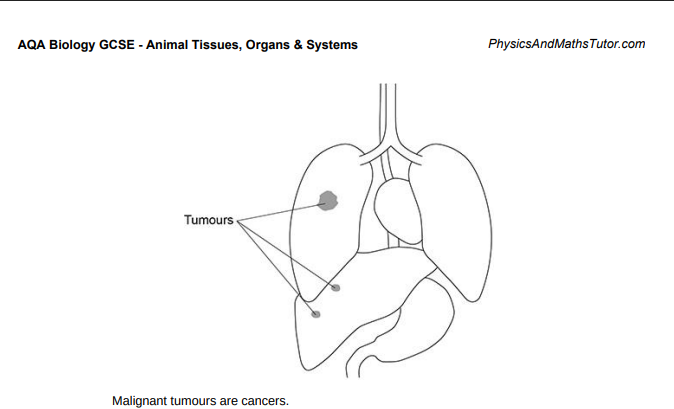
Describe what happens to cells when a tumour forms(1)
cells divide abnormally
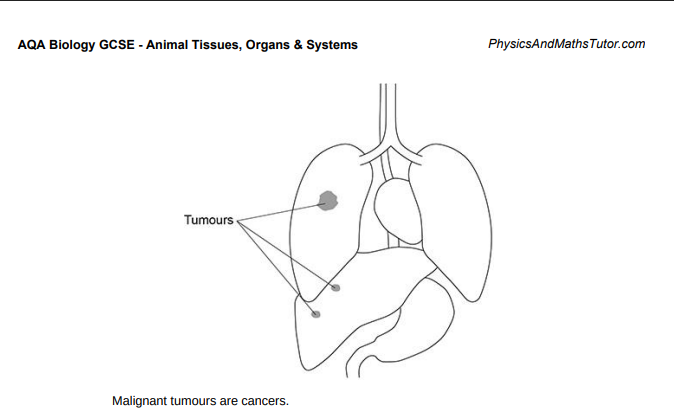
What evidence is there in Figure 1 to suggest that the tumour in the lung is malignant?(1)
Has spread to other parts of the body
Some types of cancer can cause the numbers of blood components in a person’s body to fall to a dangerously low level. A person with one of these types of cancer may experience symptoms such as:
• tiredness
• frequent infections
• bleeding that will not stop after the skin is cut.
Explain how a very low number of blood components in the body can cause these symptoms.(6)
Tiredness is caused by fewer red blood cells so less haemoglobin meaning less oxyen is transpoted around the body. This causes less energy to be released for the body because without oxygen less aerobic respiration takes place causing tiredeness. Frequent infections are caused by the lack of white blood cells meaning less antibodies are produced and fewer pathogens are killed. Excessive bleeding is caused as blood does not clot due to fewer platelets.
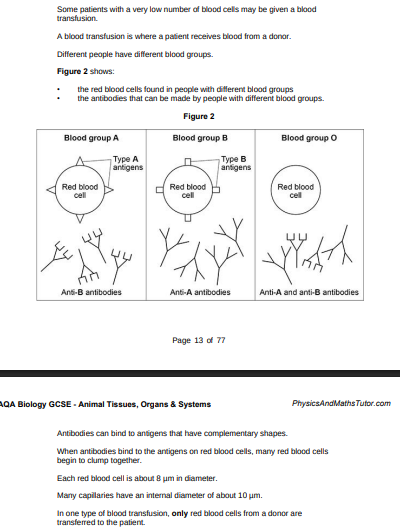
It is dangerous for a patient with blood group A to receive red blood cells from a donor with blood group B. Explain why(3)
Anti-B antibodies in patient will bind to type B antigens on person’s red blood cells so red blood cells clump together and block artilleries. Cells have reduced supply of oxygen meaning they can’t respire.
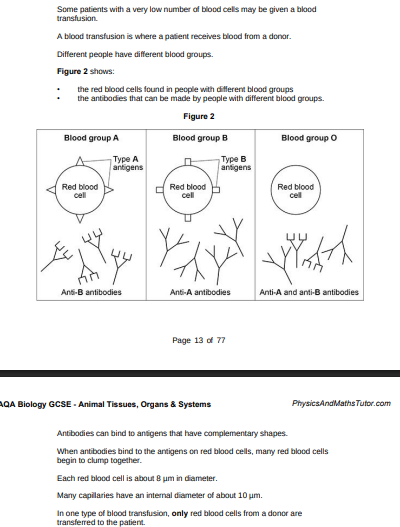
Explain why blood group O red blood cells can be given to patients with any blood group.(2)
There are no antigens on type O red blood cells antibodies cannot bind to the antigens.
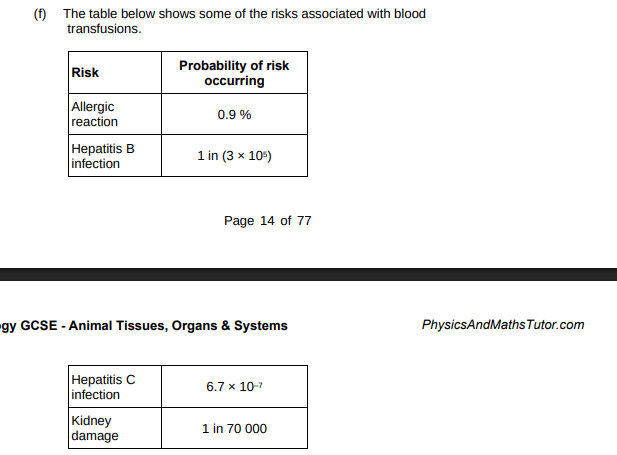
Which risk has the lowest probability of occurring?
Hepatitis C infection
A person has a tumour blocking the tube leading from the gall bladder to the small intestine. Explain why this person would have difficulty digesting fat.(5)
No bile reaches the small intestine so there is no emulsification of fat so there is smaller surface area for lipase to break down fat. Ph is also not neutralised so lipase is not at its optimum Ph to break down fat.
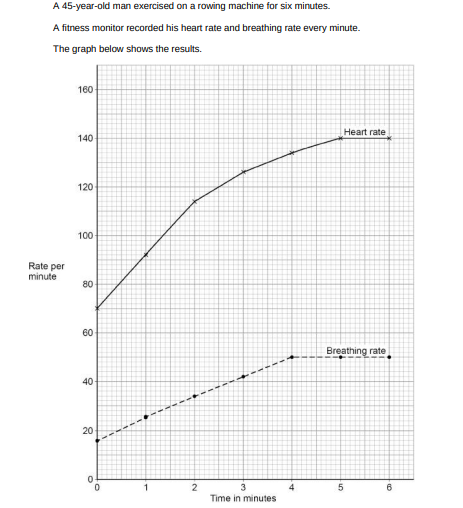
Describe the trend for breathing rate shown in graph. Use data from the graph in your answer.(3)
Increased until 4 minutes then stayed constant.
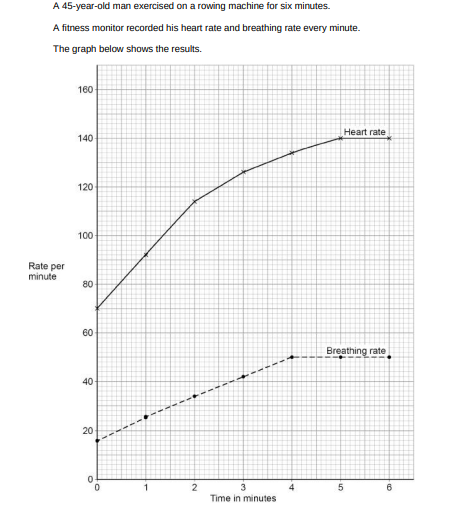
The safe maximum heart rate for a person exercising can be calculated using the equation: safe maximum heart rate = 220 – age in years. Calculate the safe maximum heart rate for the man.
220-45 = 175
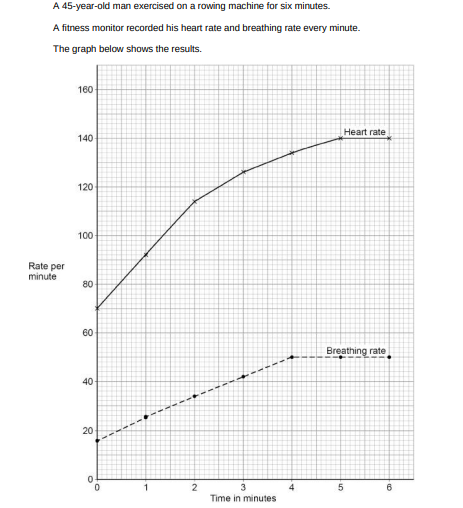
What is the man’s maximum heart rate? Use the graph above.
140
The man concluded that he was exercising at a safe heart rate. Give the reason for his conclusion. He was exercising at 140 bpm but safe heart rate was 175 bpm.
Because his rate is lower than the maximum safe rate.
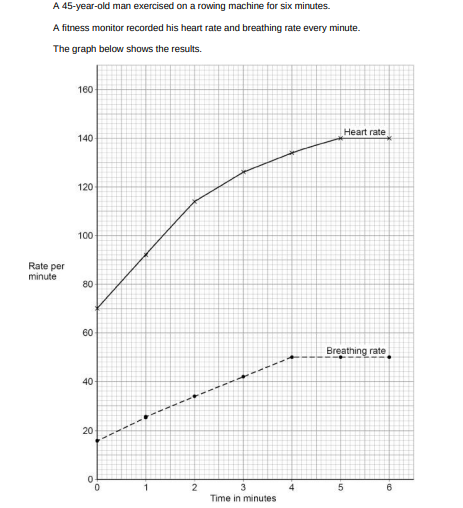
Explain the ways the man’s body has responded to the exercise. Use information from the graph above.(6)
Heart rate increased to increase blood flowing to muscles which provides more oxygen and glucose to the body and to remove CO2 and glucose quickly from the muscles. Breathing rate increased so there is also more oxygen to the blood and to the lungs thereore more carbon dioxide is removed. Oxygen to the muscles is needed for more respiration to release energy for muscle contraction and anaerobic respiration occurs due to lack of oxygen causing lactic acid build up, muscle fatigue and oxygen debt.
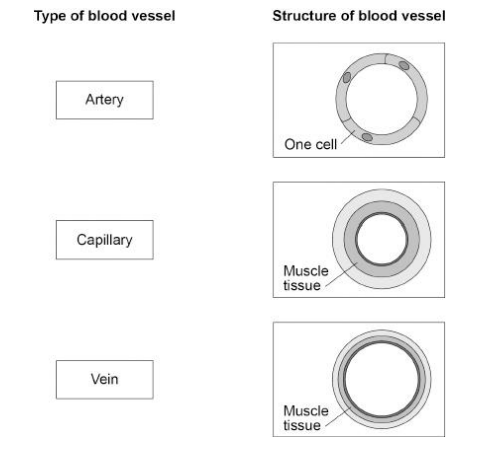
Blood is transported around the body in blood vessels. Match each one by stating 1a or 1b.
1b, 2a, 3c